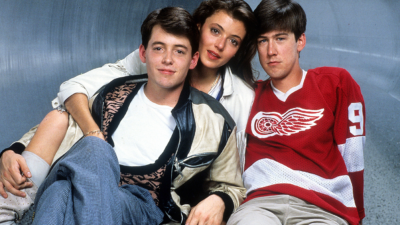Fifer, right, and Brown in a still from 'Cicada'
Behind the scenes of ‘Cicada’: Unearthing real trauma—and experiencing a real shooting
Brooklyn filmmaker Matthew Fifer discusses a movie about a budding romance that hits close to home in more ways than one
“Write what you know” is a big guiding principle for independent filmmakers in general. For Brooklyn filmmaker Matthew Fifer, that meant turning his childhood sexual abuse into his debut feature film “Cicada.” The title is a reference to the fact that cicadas emerge every 13 to 17 years, and that it took Fifer 13 years to tell his best friend he was abused, and 17 years to tell his mom.
Co-directed by Kieran Mulcare, “Cicada” is the love story of Ben (Fifer) and Sam (Sheldon D. Brown). For their love to blossom, each need to deal with the ways in which they are damaged.
When the two meet, Ben is stuck in a pattern of one-off trysts and is haunted by dreams of his step-father molesting him. In reality, Fifer himself was abused by a family acquaintance. The cycle of hook-ups to bury the trauma of his abuse begins to break when Sam and Ben form a relationship after meeting at the $1 book rack at The Strand. Their relationship helps each other safely explore their wounds and talk about them with family members who need to know their stories.
“Cicada” is loosely based on Matthew Fifer’s trauma and as his actual friendship with actor and friend Sheldon D. Brown. The two first met at the movie theater bar Syndicated, in Williamsburg, when Brown was in town visiting from Chicago. Though the two never had a romantic relationship,Fifer would ask Brown to star in his movie as the romantic lead. After working through the script together, not only did Brown agree to be in the movie but he contributed significantly to the story—in ways that neither of the two could have anticipated.
Two months after he agreed to star in the film, Brown was hit in a random shooting in Chicago. It threw the production into chaos and only as Brown healed it became apparent to Fifer that the shooting must be included in Sam storyline, too, for logistical reasons as much as it adds painful depth to the character.
“Cicada” is now playing at the Quad Cinema in Greenwich Village, is available to rent, and boasts cameos by SNL’s Bowen Yang and “30 Rock” star Scot Adsit. We spoke with Matthew Fifer about filming the movie in Brooklyn, how Brown’s being shot changed everything, and directing himself in sex scenes.
This interview has been edited for concision and clarity.
Sheldon D. Brown plays your love interest Sam in “Cicada.” How did the two of you meet?
In 2015, Sheldon and I met on a date similar to the one in the film. I knew that he lived in Chicago and it was gonna be very brief. But, I hadn’t come out yet, and it was really special for me. I remember sharing very intimate moments of my life with this stranger and he opened up to me. I remember when I came out to my mother a few months after that, I showed her a picture of him. And… I don’t know if it’s normal for guys coming out to be like “Oh, Mom, it’s okay. Look at this handsome person who might be in my future.”
So how did you decide your real-life relationship should be dramatized in the movie?
We stayed in touch on Instagram and I started writing a script. The day I finished that first draft, I texted Sheldon, “Hey, if you’re in New York this spring, I think you’d be really great for this project.” And he texted back that he was actually in New York at the very moment. So we grabbed a drink and a week later he said yes to be in the movie on February 7. Then on April 7 I got a text saying that he was shot in Chicago.
Which you incorporated into the movie.
Yeah we didn’t know if Sheldon was going to be okay. He didn’t know if he was going to be okay. Everything fell apart. He talks about the experience in the film, I want to let him tell his story but a month after his surgery, he called me. He was back on his feet and healthy enough to work again, the only problem is he had lost 40 pounds, he had a large scar, and an ostomy. We didn’t know what to do. We felt sick about recasting him, I never had another person in my mind for the part. The film had always been about my personal trauma, toeing the line between narrative and documentary. I knew if he was healthy enough we could try to make this movie together, to work through the pain. A couple weeks later, he came on as a writer and worked his own story into the character.
Have you met viewers who also experienced molestation, and if you have, how do you handle it?
It’s one of the best parts of releasing “Cicada” in theaters, where somebody can come up to you afterwards and they can share their story and you can reach out and hug them. The movie played at many, many virtual film festivals last year and I received these very sweet DMs about the movie, but I didn’t really know what to say. I really just wanted to reach out and hug them or share a drink, and talk. So that’s been one of the most rewarding parts of this whole experience.
Where in the borough did you film the movie?
The whole project started in Brooklyn because Sheldon and I met at Syndicated, this movie theater in Bushwick. So our first meeting happened there. I lived in Bushwick for almost 10 years and we shot 85 percent of the film at the Morgan stop off the L train. Everything was filmed at friend’s places. We also shot in Manhattan at Washington Square Park. We just showed up at 5:30 in the morning, so we didn’t get permits.
What was it like directing yourself in the nude and in sex scenes in front of a 20 person crew? Maybe it’s completely easy for you but I just can’t imagine doing it.
It’s insane and I don’t recommend it to anyone. Really, the only reason was I felt safe. I felt like I was being held. Kieran Mulcare, my co-director, was also my therapist. He would help me meditate in the morning, and he encouraged me to play this part. He is also an incredible actor and because of that, an incredible director. If my performance is any good it’s entirely because of him. Sheldon, who was coming from this very traumatic incident, just three months before, standing before me every day, living his truth in front of 20 strangers every day, that was the bravest. I really don’t know how he did it. So really, every day that he was able to come to set and continue to act, I was able to.
You might also like 


























